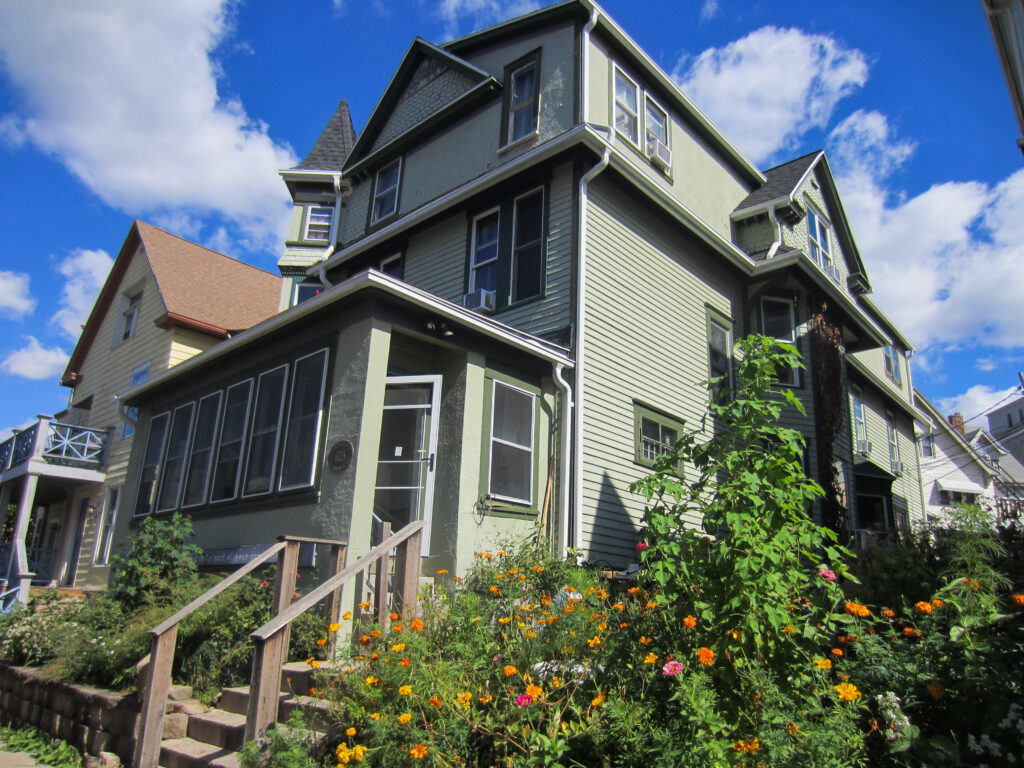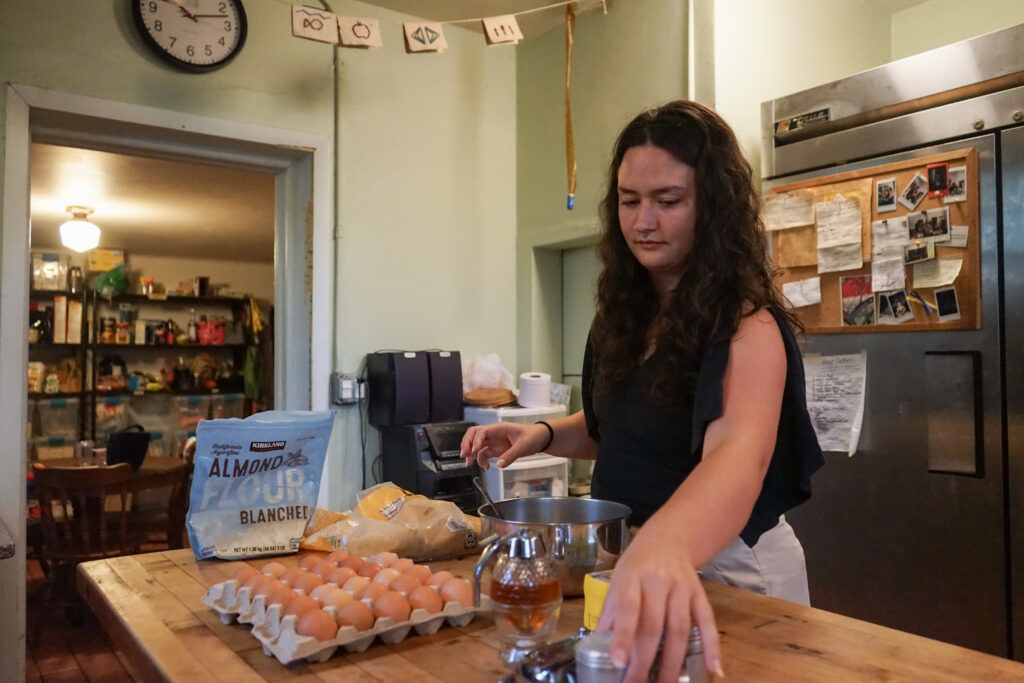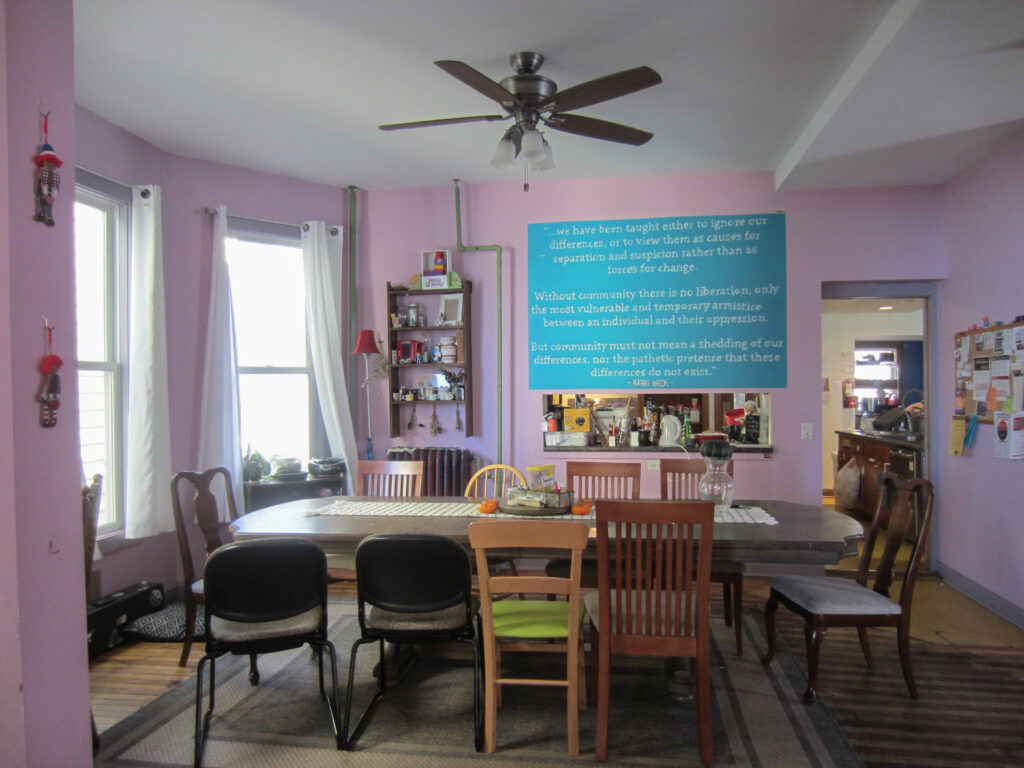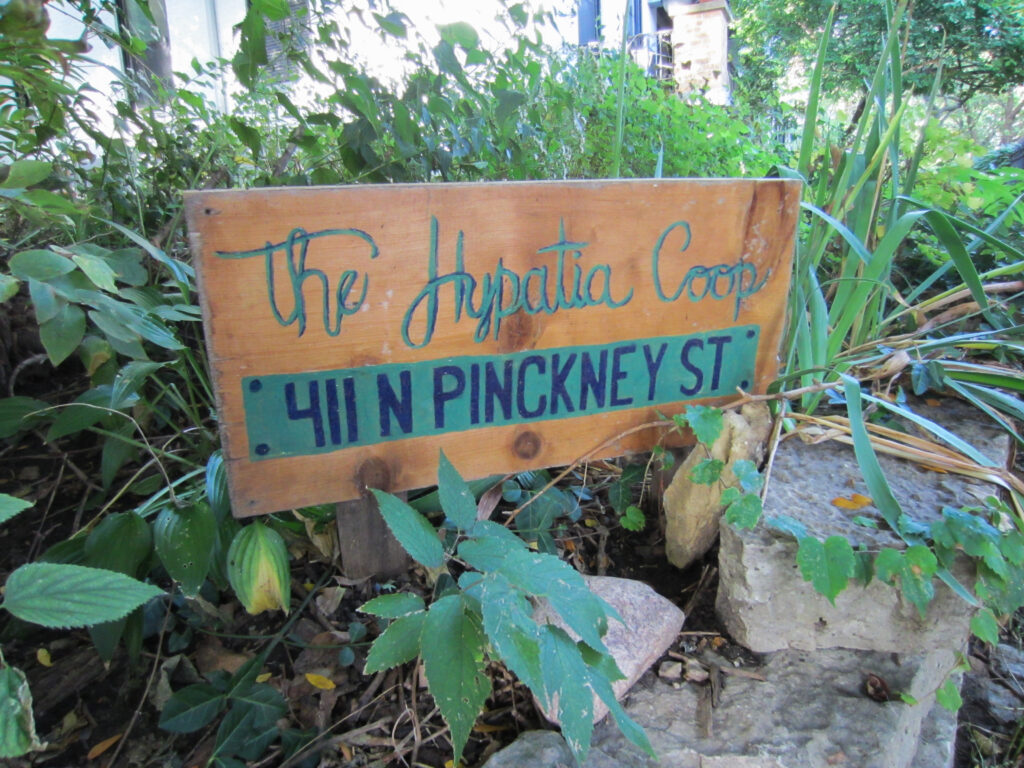It’s Monday night at Hypatia Cooperative House, and the table is set with the mismatch of tableware — all collected by Hypatians over the years. Tonight’s menu consists of vegetarian chili, roasted potatoes and a side of steaming-hot gossip about the progress on the hallway paint job.
This evening is one of the several house dinners the Hypatia residents will eat together this week, each made by different co-op members as part of their housework rotation.
For this meal, Miette Hennessy gladly grabbed the ladle.
“To cook for more people, at least for me, feels more rewarding and worth the time. It’s not that much more work to cook for more people, but you get so much more out of it,” says Hennessy, a 24-year-old doctoral student at UW–Madison.
Shared cooking responsibilities are just one aspect of cooperative living at Hypatia, a Mansion Hill house on Madison’s North Pinckney Street. The house was first used as a womens’ co-op in 1946. Originally called the Groves Housing Cooperative, the house became Hypatia in 1987.
The house is one of the 11 co-ops that make up Madison Community Cooperative, a nonprofit organization dedicated to providing low-cost inclusive housing for the Madison community.
At its core, a cooperative housing model shares the costs and labor of maintaining a household among its residents while operating under a structure of collective decision-making. Madison Community Cooperative was established in 1968 to accommodate a boom of new co-ops forged from a need for safe spaces among minority groups.
Now, unbeknownst to hundreds of students who walk by these homes on their daily commutes to class, Madison’s cooperative houses are building on the legacy created by generations before. In addition to safety, as the cost of living in Madison continues to rise, housing co-ops have the added incentive of offering Madisonians relief from the rising cost of rent — that is, of course, only if they’re OK with having a whole lot of roommates.

Co-ops offer affordable housing
Hennessy, a self-proclaimed “co-op proselytizer,” began her journey at Hypatia three years ago. While preparing to move to Madison for her graduate program in plant pathology, she was struck by the expensive cost of housing.
“I had been looking for months, and all I could find was really terrible studios for $900 a month or these luxury apartments that I will never be able to afford, and that I don’t really want to live in anyway,” Hennessy says.
After some internet sleuthing, she came across the Madison Community Cooperative website. Scrolling through the listings of open rooms, Hennessy was drawn to Hypatia for its location.
Well, that, and one very specific aesthetic feature — its big, beautiful windows.
“Having a built-in community coming to a new city was really nice and has been great, and it’s nice to not come back to an empty house. “
Aurora Schaafsma lives at Audre Lorde Cooperative House, a co-op with values inspired by the eponymous Black lesbian author who was an advocate for women, people of color and the LGBTQ+ community. Schaafsma, too, was initially drawn to cooperative living for its affordability.
“About a year and a half ago, I was having trouble paying for rent. I asked around for some advice and some people brought up co-ops,” says Schaafsma, the 28-year-old house treasurer at Audre Lorde.
Madison Community Cooperative houses are able to stay affordable primarily due to its status as a nonprofit, according to John Parsons, president of Madison Community Cooperative and a resident at Lothlórien Cooperative House.
“If you look at the skyrocketing rents in Madison, a lot of that is people who know they can get however much money they want when there’s such a demand,” Parsons says. “It’s simple supply and demand and also human greed. If there’s tons of people and they all have to have housing, they can charge $2,000 for an apartment because guess what, somebody’s gonna pay it.”
According to Parsons, another component that contributes to the affordability of co-ops is the shared cost of utilities, food and basic living supplies — dish soap, laundry detergent and toilet paper — which are purchased in bulk to further reduce expenses.

What comes with a community
Cooperative living isn’t just about affordable rent. Joining a co-op means gaining an entire community that shares labor, company and support.
For Hennessy, each of these factors played a large role in originally drawing her to co-op living, and they continue to keep her there.
“I had just come from living with more people and enjoyed having people around, also, the idea of doing shared labor was appealing,” Hennessy says. “Having a built-in community coming to a new city was really nice and has been great, and it’s nice to not come back to an empty house.”
Like Schaafsma, Leah Entenmann also lives in Audre Lorde, and for them, the community that comes with co-op living changed their day-to-day for the better.
“In the past when I’ve moved to new cities — like when I moved to New York — I had been very lonely and isolated at times,” says Entenmann, a 41-year-old doctoral student at UW–Madison. “So having people I not only live with, but that I am forced to collaborate with, has been huge.”
At Audre Lorde, mutual aid is a central value for their community, whether that be help with making dinner or assisting with a BadgerCare insurance application. For Schaafsma, mutual aid has been essential amidst a debilitating hand injury.
“I have long-term hand issues that are especially bad right now… That means there’s a lot of physical things I can’t do,” Schaafsma says. “When I’m making pasta, I often will ask for help pouring the pasta into the colander because lifting that big thing with one hand is impossible for me. That’s been amazing to have.”
Community is a prevalent part of co-op living that sets it apart from other housing options, and for that reason, Parsons warns that is not for everybody. If you’re someone who needs lots of alone time and control over your space, he says, a housing co-op might not be the best fit.

Creating a safe space for residents
Unlike a standard apartment, the co-op application process typically requires multiple meetings prior to acceptance.
The membership process for Hypatia includes three dinners and an interview, as well as a written questionnaire. This allows house members to evaluate practical logistics — like schedules and the applicant’s intended length of stay — as well as gauge their interest in the specifics of cooperative living, including shared labor and attending house meetings, Hennessey says.
Additionally, it provides an opportunity to evaluate the applicant’s character — ensuring they will contribute to a safe and welcoming environment for other residents.
At Audre Lorde, a similar application process takes place, ensuring the house remains a safe, inclusive space for all its members.
For Entenmann, this was crucial.
“Knowing upfront that this was a queer-and-trans-inclusive space was very important for me,” Entenmann says. “One of the things I value most about living here is that we are a safe space for people who might face housing discrimination or social discrimination.”
Although co-ops can be selective about who they accept, it is still essential that they adhere to the Fair Housing Act, which forbids withholding housing based on race, sex, religion, disabilities, age, political beliefs or sexual orientation, according to the U.S. Department of Housing and Urban Development, the federal department that administers housing and urban development programs.
While co-ops cannot turn anyone away because of their political beliefs, they can consider opinions that may put current house members at risk, Hennessy says.
“Technically, political affiliations are included in the Fair Housing Act, so it’s something we can’t discriminate against,” Hennessy says. “But if it were to be someone who has a hateful opinion that would make our current members unsafe, it would be in our rights to be like, ‘Yeah, you can’t live here if you’re transphobic.’”

A handmade sign amid the greenery, welcoming members and visitors to Hypatia. Photo by Lily Spanbauer.
Co-ops as a solution
It is no secret that the price of rent in Madison has skyrocketed in the last few years. The National Rent Report by Apartment List — a company that conducts research, analysis and data on the U.S. rental market — indicates that Madison’s rent prices have increased by 35.8% since 2020. This jump has driven many Madisonians to consider alternative housing situations like co-ops.
This increased interest in cooperative housing is apparent at Audre Lorde, where membership has grown exponentially since 2022.
“We are at a full house now. When I moved here two years ago, we were kind of building up from scratch, there were only two people living here,” Entenmann says.
Now, according to Entenmann, the co-op’s membership coordinator is getting five to six inquiries per week.
The city recognizes cooperative living as a solution to its rising rent prices. According to the City of Madison Mayor’s Office, efforts are underway to support the establishment of new housing co-ops through proposed updated zoning codes. These changes would permit co-ops in more districts and make the zoning permit process more equitable for such buildings.
Back at Hypatia, Hennessy clears her empty bowl off of the table, walks through the partially painted hallway and descends to the basement’s communal kitchen. She scrubs the dishware and places it beside the dozens of others on the drying rack.
While Hennessy doesn’t quite know if she’s a co-op “for-lifer,” she’s certain that as long as she’s in Madison, Hypatia is home.